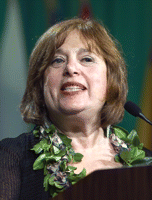Bernstein's Presidential Themes, Initiatives
Discovery

Carol Bernstein, M.D.
DSM-5 is working toward an anticipated publication date of 2013. Thirteen work groups have completed initial reviews of potential changes.
A Scientific Review Committee was established to evaluate the science that has informed new proposals for DSM.
Incorporation of public feedback has been vital. Response to the posting of draft criteria for DSM-5 included nearly 9,000 comments.
Financial constraints on research require developing new approaches to collaboration between academia and industry to facilitate research and development without compromising scientific integrity.
Collaboration
Patient-centered care has become the watchword of 21st-century health care delivery in the United States, a fundamental shift from the individually driven, hierarchical doctor-patient interactions of the last century to a more team-based, patient-focused alliance.
New health care delivery systems such as accountable care organizations and the medical home may provide new venues for psychiatry and psychiatric patients to be fully integrated into the medical community.
Leadership
Holding town-hall meetings with residents and early career psychiatrists around the country is crucial to the effort to reach out to future leaders of APA and psychiatry. Younger generations of psychiatrists and patients have fundamentally different approaches to authority, change, work-life balance, and communication.
Social-media technology has transformed the global dissemination of information and will have a profound impact on APA and psychiatric practice.
APA leadership—its past presidents and members of the APA Board of Trustees, Assembly, and components—must develop and implement mentorship programs for trainees and young psychiatrists in their communities.
Every academic department should consider devoting one grand-rounds program annually to informing faculty and residents about APA's strategic agenda and ways to become involved in advocacy, education, and outreach in their local areas. Such presentations would provide an opportunity to link the academic world with the clinical community that it serves.



